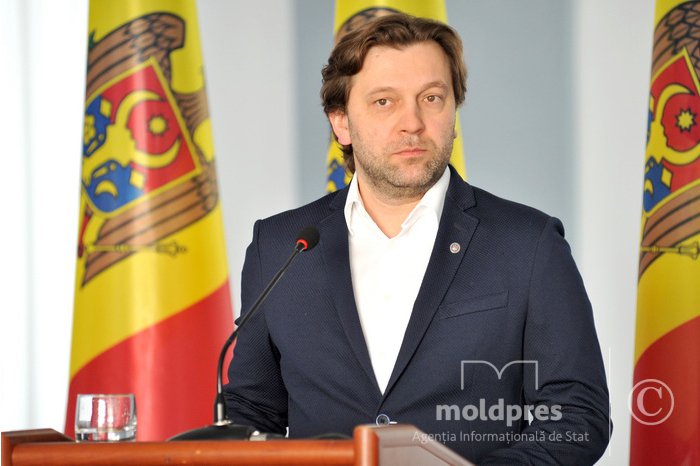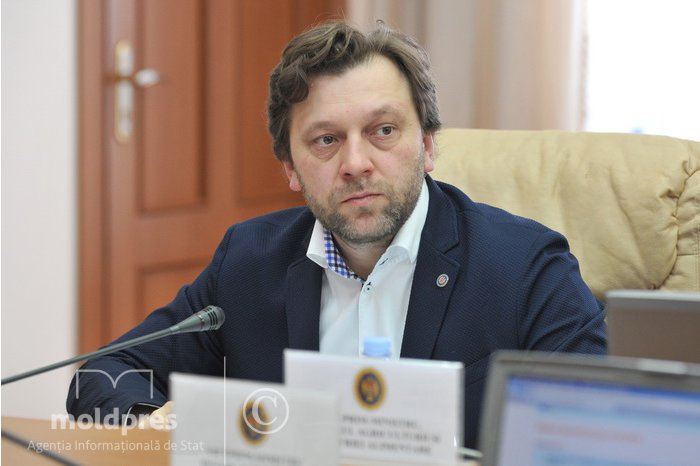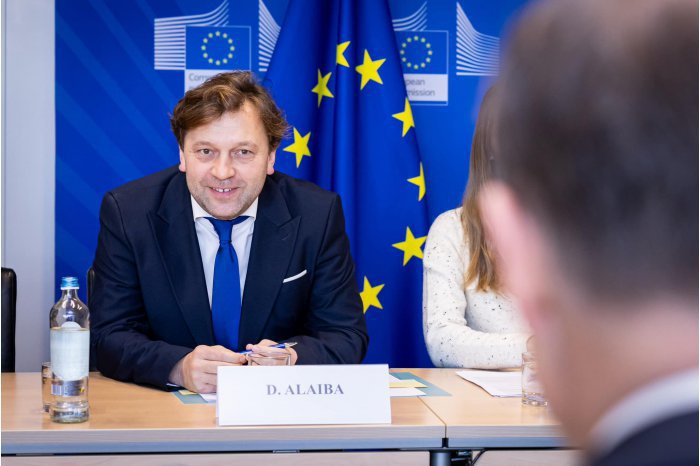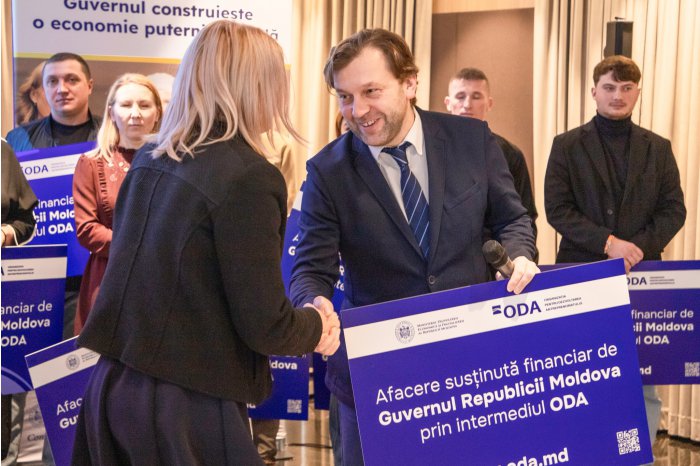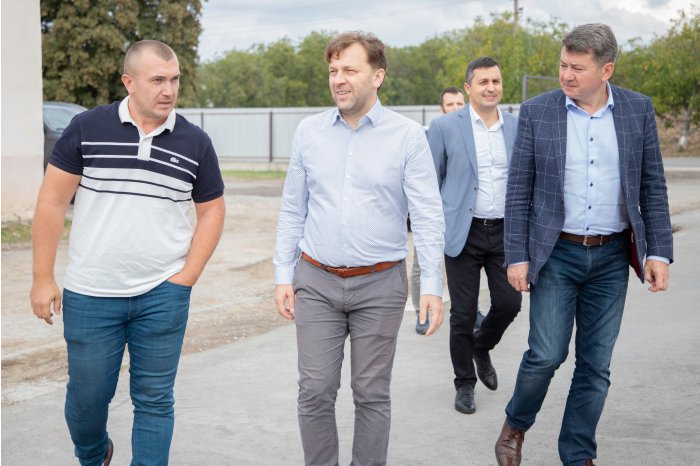MOLDPRES INTERVIEW // Moldovan deputy PM, economic development, digitalization minister says progress made in 2024 year, despite all challenges
13:34 | 02.01.2025 Category: Interview, Event
Chisinau, 2 January /MOLDPRES/ - Interview given exclusively with the MOLDPRES Agency by Deputy Prime Minister, Economic Development and Digitalization Minister Dumitru Alaiba.
MOLDPRES: Mr. Deputy PM Dumitru Alaiba, how the 2024 year was for Moldova’s economy?
Dumitru Alaiba: The 2024 year was one with progress, despite all challenges we had. In a complicated context, the first nine months brought, though a modest, growth of 0.6 per cent of the Gross Domestic Product (GDP). Certainly, we expected a higher growth; yet, the last summer drought hit the harvests of maize, sunflower and wheat considerably, having a significant impact on the economy, given the important role of the agriculture in GDP.
Nevertheless, many economic sectors had quite good performances:
· Information and communications technology (ITC): +6.1 per cent;
· Constructions: +6 per cent;
· Processing industry: +3.9 per cent;
· Energy industry: +14.8 per cent;
· Financial activities: +7.5 per cent;
· Diverse services: +16.7 per cent;
· Public administration: +2.8 per cent;
· HoReCa: +5.5 per cent;
· Domestic commerce: +0.5 per cent.
An encouraging signal is the increase in private investments, which grew by 12 per cent on the period January-September, after the decreases during the 2022-2023 crisis years. Also, the constructions sector returned to an ascendant tendency (+6 per cent) and the private consumption grew by 2.6 per cent, being the principal engine of the economic growth.
Another positive aspect is an ever higher confidence of the entrepreneurs. For the third quarter in a row, the companies have been investing more – a clear-cut signal that the business environment feels the long-term good perspectives. On our behalf, we continue to support this tendency through structural reforms and measures which facilitate the access to financing.
The general direction is a positive one, although the 2024 year was marked by difficulties, our economy starts regaining its pace.
MOLDPRES: You say that our country’s economy gives signs of recovery, but still faces some challenges. Which are they and what actions the authorities undertake to overcome them?
Dumitru Alaiba: Moldova’s economy works, starts recovering. And this visible: the inflation decreased, the companies invest more and the bank loans are more accessible. All this progress shows the measures which we have implemented, but we know that we still have to work.
One of the greatest challenges stays the lack of a competitive industry. Many of our companies have no access to enough financing sources, in order to grow and modernize. Therefore, we work intensely for the creation of a capital market. The latter will open new opportunities for companies, giving them better alternatives for financing. The goal is clear: to help them invest, to innovate and to even stronger contribute to the country’s economy.
Another problem is that we export too much gross products, especially from the agro-food sector, without adding enough value. The solution is the industrialization of complex chains of production, which is to turn the raw material into finished, competitive products on international markets.
To overcome these challenges, we focus on policies due to support the entrepreneurs and attract investments. At the same time, we work to increase the number of safe and well-paid jobs and to improve Moldova’s position on the external markets. We need a modern economy, which is to provide as many as possible opportunities to all citizens.
MOLDPRES: We see how the Moldovan products gain ever more ground on markets of the West. Presently, over 65 per cent of Moldova’s exports reach the European Union and more than 81 per cent of the foreign direct investments in the economy come from EU. Where do we have still room for growth and how these figures might change, as we are nearing the status of European Union member country?
Dumitru Alaiba: Our products gain ever more appreciation on markets of the West and the European Union consolidated as the main and the surest economic partner of our country. At present, 65 per cent of the exports go to EU and 81.5 per cent of the foreign direct investments come from the Union’s member states. Just for comparison, as little as 6 per cent of the foreign investments come from the Commonwealth of Independent States (CIS), i.e. by over 23 times less.
Romania, Cyprus, the Netherlands, Italy and Germany were the principal countries investors in Moldova’s economy. This thing confirms that EU is not only the main destination for our exports, but also the majority source.
Looking forward, the integration into the European Union opened huge economic opportunities for Moldova. All countries which joined EU experimented an accelerated development, stimulated by the increase in the commerce and investments. This progress found expression inevitably in higher incomes for citizens – higher salaries and pensions, as well as a better quality of life.
Obviously, there is room for the better. And we do our utmost to turn to good account this potential. For instance, the extension of the liberalization of the trade with the European Union is a direct support for our entrepreneurs. We take just a concrete case: starting from 2022, Moldovan producers have been able to export without customs duties larger quantities of apples, garlic, sweet cherries, grape juice, plums, tomatoes and table grapes. These commercial facilities allow us extending our presence on the European market and providing competitive products.
These efforts will make our products reach even more tables in Europe and the people of Moldova will be able to feel even more the benefits of an economy connected to the European standards.
MOLDPRES: What actions the state is undertaking, in order to help the companies of Moldova achieve the EU’s quality standards, to accede to the Union’s market?
Dumitru Alaiba: The aligning with the European standards is not made overnight. This is a complex process, which takes time, adaptation and investments. We, as state, understand these challenges and work in order to back the entrepreneurs make this important step.
A concrete example is the support provided by the Organization for Entrepreneurship Development (ODA). In 2024, over 595 companies benefited from grants worth over 250 million lei. These funds were directed to digitalization, upgrading, ecologization and other essential investments, which do not only help companies grow, but bring them closer to the standards demanded on the EU market.
Thus, we provide the local companies with the instruments needed to become more competitive, more sustainable and more prepared to cope with the EU market’s requirements.
MOLDPRES: At the end of the year, the Economic Development sand Digitalization Ministry (MDED) launched, for the first time ever, a mechanism of state assistance for the investments in Moldova’s industry, which provides for the return to companies of 60 per cent of the resources invested in the processing industry. Which do you estimate will be the impact of this initiative?
Dumitru Alaiba: The state assistance is a strong instrument, a clear-cut commitment, through which we encourage new investments, support the extension of the businesses and create new factories, plants, new safe and well-paid jobs in our country. We have concrete plans and the resources necessary, in order to enforce them.
More exactly, the state will return up to 60 per cent from the investments made to our big and small companies, which will invest in the extension and development of the business, in the following sectors:
· Electronic industry;
· Chemical and pharmaceutical industry;
· Machine-building and automotive industries:
· Textile and clothes industry;
· Industry of construction materials;
· Food industry.
And will be structured as follows:
· 25 per cent will be provided immediately, in form of non-refundable grants.
· 75 per cent of the sum returned will be allocated in form of exemptions of 50 per cent in the income tax;
The overall budget of this mechanism for the next ten years is of at least 2 billion lei, with possibility of its extension in case of a higher demand.
It is for the first time ever when Moldova launches such a mechanism of assistance aligned with the European practices.
According to the National Programme on Industrialization, till 2036, we expect overall investments of more than a half of billion euros, which will modernize the industrial infrastructure, will bring new technologies and will create safe and well-paid jobs in Moldova.
MOLDPRES: In the last year, more foreign companies informed that they would invest in Moldova. Could their number increase in 2025? What actions the state is undertaking, in order to attract foreign investments?
Dumitru Alaiba: Investors come to Moldova! Despite the current challenges, we manage to attract the interest of those who understand that the investment in Moldova is an investment in future. Certainly, the situation in the region does not help us at present. But this means one thing: that we must work thrice more, in order to achieve the same result. This is what we actually do.
In 2024, we informed about several investors willing to invest in our country.
· Shape Robotics (Denmark): investment of 3 million dollars in the field of construction of robots.
· CompuTech (Israel): investment in IT field.
· ROCA (Romania): investment of 2 million dollars in the field of production of construction materials.
· Palplast (Romania): investments of 3 million dollars in the field of production of tubes.
· Expert IT (Romania): investment in IT sector.
· Sterileco (Romania): investment of 1.5 million dollars in the field of recycling of chemical waste.
· Schneider Group (Germany): initial investment of 200,000 dollars in the sector of consultancy services. The company will help other companies enter the market of Moldova.
· EBS Electric (Romania): investment of 500,000 dollars in electronic sector.
· Obermeyer (Romania): investment in constructions engineering.
· Knauf (Germany): investment of 7 million dollars in a factory of drywall plaques.
· Sumitomo Electric Bordnetze (Japan) – yes, that very Sumitomo, about which lies were promoted, putting that it would leave, extended its activity this year.
· Magnetec Components (Germany) – specialized in the production of induction field coils, including the construction of vehicles, renewable sources, electric technology and automotive.
We want to attract as many investors as possible; therefore, we came up with this MEGA important mechanism of state assistance, which will compensate the investment’s expenses by up to 60 per cent! We do our utmost to help!
MOLDPRES: The MPs have recently voted the seventh package on the de-bureaucratization of the business environment’s work. What changes the 2025 year brings for the entrepreneurs of Moldova?
Dumitru Alaiba: Besides those 3 billion lei saved by the entrepreneurs this year through reducing the bureaucracy, in 2025, they will benefit from a string of important changes which will simplify their work and will cut the useless costs. At the end of this year, we approved a new package of reducing the bureaucracy and of updating the rules which became obsolete long ago:
1. We introduce the compulsoriness of indicating the origin country for the non-prepacked food products. We thus encourage the purchasing of products made in Moldova. Sometime you buy, without knowing the local qualitative alternatives.
2. We extend the validity term of the Health & Safety Permit from 1 to 3 years.
3. We remove the restrictions as to the wholesale trade, allowing this type of commerce also in rooms smaller than 400 square metres, which will cut the rental and maintenance costs. This measure will support the small businesses grow and develop.
4. The stockholders from stock companies will sign the documents online, will organize online meetings and will vote by electronic means. Thus, they will save time and money, avoiding expenses for notary services and physical trips for holograph signature.
5. The procedure of closing a business becomes simpler and quicker, shortening the term from 3 working days to 24 hours.
6. We make uniform the rules of licencing of the drug stores from villages, no matter whether they are subsidized by the state or not. In this way, we will encourage the opening of more drug stores in the rural areas, giving residents easier access to medicines and health services.
We will soon come up with other initiatives, which will simplify even more the work of the entrepreneurs from Moldova. We are dedicated to provide a real support to those who want to develop sustainable and competitive businesses.
MOLDPRES: The drought from agriculture hit the economic growth this year. Do you have a forecast concerning the economic growth for the 2025 year?
Dumitru Alaiba: The drought in agriculture had a significant impact on the economy and took away 7 percentage points from the GDPs growth. In the context, the Agriculture and Food Industry Ministry makes significant efforts to consolidate the resilience of the farming sector to the climate changes. At the same time, we are to analyze together the most recent data available and during the first quarter, we will update the forecast for the 2025 year.
MOLDPRES: In the autumn of this year, EU presented the biggest package of financial support provided to Moldova since the declaration of the Independence so far – the Economic Growth Plan worth 1.8 billion euros. When the first installments of this assistance will be disbursed and how the money will be spent?
Dumitru Alaiba: The economic growth plan represents a big chance to speed up the development of the economy and to move with quick steps to the European level of living. Its goal is to get our country closer to the European Union, through a significant acceleration of the reforms and investments in a relatively short term. This will back us in achieving our objective of economic growth of 8-10 per cent, which is so necessary!
The plan has in view the construction of roads, bridges, hospitals, development of the railway infrastructure, providing of financial support for businesses, attraction of investments, finishing and starting of new power lines, along with numerous other major projects.
Moreover, besides investments, this plan will contribute to the improvement of our access to the European Union’s Single Market. It will include, inter alia, the facilitation of the commerce and of the transport connections, the integration into the European energy and digital market, as well as the access to the Single Euro Payments Area.
With these resources, we will be able to implement essential reforms and investments for the consolidation of our economy: construction of roads, bridges, hospitals, railway infrastructure and many other important projects. The European Union has been and stays a reliable partner and this partnership becomes ever more solid, as we near the integration into the European family.
MOLDPRES: Mr. Deputy Prime Minister Dumitru Alaiba, we thank you for the interview.
Author Natalia Sandu
